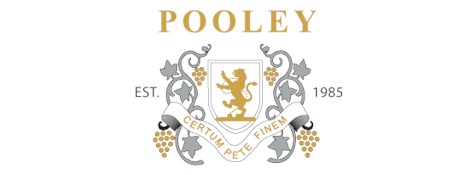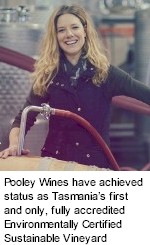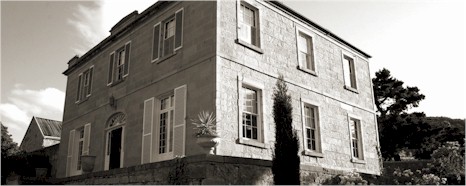


Pooley Wines were established 1985 when the late Denis and Margaret Pooley planted ten rows of Riesling and seven rows of Pinot Noir on their 16 hectare farm at Cooinda Vale in the Coal River Valley of southern Tasmania. Margaret Pooley remained the chief executive of Cooinda Vale Vineyard until well into her nineties. She was a hardy Scot and could be found tending vines during the coldest Tasmanian winters. The family’s love of wine was ignited many years ago after he and Margaret arrived in Tasmania from England, way back in 1954. Denis became a founding member of the Hobart Beefsteak and Burgundy Club, there were only six members and it was Hobart's most exclusive social club. Three generations of the Pooley family have since worked alongside each other in the estate vineyards, until matriarch Margaret's passing in 2010.

Coal River Valley produces some of Australia’s finest wines and the Pooleys are one of its longest established growers. The original Cooinda Vale vineyard is ideally positioned facing northeast overlooking Coal River. On the 43.5 Latitude line, the vineyard is planted on northeast facing slopes between 80 and 100m above sea level. This is a unique microclimate, being well protected from prevailing winds but still highly influenced by maritime conditions. The long growing season, which can extend into May, with high sunshine hours, predominately winter rainfall and the occasional frost and snow, combine to provide an excellent condition for cool climate grape varieties, such as Pinot Noir, Pinot Grigio, Riesling and Chardonnay. Warmer summer daytime temperatures and clear autumn days contribute to this site proving to be rewarding for Syrah, Cabernet Sauvignon and Merlot.
Pooley's Belmont House is a stately old manor, located close to Richmond in Coal River Valley. It was built of sandstone blocks, quarried from Butchers Hill by convict labour in 1832. Similar stones from the same quarry were used to construct Richmond Bridge, Australia’s oldest bridge still in use, built in 1823.
Butcher’s Hill Vineyard at Richmond was established 2003. The addition of a second Single Vineyard site to Pooley Wines has provided depth and diversity. Located on the steepest slopes in Coal River Valley, only 3km from Frederick Henry Bay, the afternoon sea breeze and prevailing winds off the roaring 40s ensure smaller variations between day and night temperatures.

Recognised for their modern, environmentally focused approach to leading viticulture practices, Pooley Wines have achieved status as Tasmania’s first and only, fully accredited Environmentally Certified Sustainable Vineyard. Along with constant care to minimise the impact of farming practices across the vineyards, the Pooley Wines viticultural philosophy is simple. From ground to grape and grape to glass, at the heart of all they do, their actions must never lose focus on providing the most environmentally sustainable approach to viticulture. Generations of tomorrow may benefit from the skills and experience of what was learned today. Pooley Wines are also proud to have received the prestigious Tasmanian Royal Agricultural Society Vineyard of Year Award, in recognition of the winery’s outstanding quality of estate made wines. Pooley have amassed a truly breathtaking tally of Trophied and Gold Medals at significant national industry competitions.
